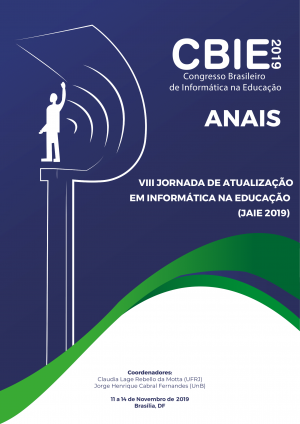VIII Jornada de Atualização em Informática na Educação
Palavras-chave:
JAIE 2019Sinopse
As Jornadas de Atualização em Informática na Educação (JAIE) são momentos e conteúdos de atualização científica e tecnológica para a comunidade de Informática na Educação (IE) do Brasil. Elas são organizadas anualmente na programação do Congresso Brasileiro de Informática na Educação sob a forma de um conjunto de minicursos. Cada jornada enfoca temas atuais e relevantes da área de IE. Eles visam estimular a formação de pesquisadores das áreas de Computação, Educação, Psicologia, Design e afins com abordagens teóricas e metodológicas contemporâneas e de vanguarda. Quatro capítulos integram essa edição da JAIE: “Metodologia neurocientífica-pedagógica aplicada à concepção de jogos para ativação das funções cognitivas de alunos da educação básica”; “Pensamento Computacional: Fundamentos e Integração na Educação Básica”; “Avaliação adaptativa utilizando espaço de conhecimento baseado em competência”; e “Introdução à Informática na Educação baseada em Evidências”.
Capítulos
-
1. Metodologia neurocientífica-pedagógica aplicada à concepção de jogos para ativação das funções cognitivas de alunos da educação básica
-
2. Pensamento Computacional: Fundamentos e Integração na Educação Básica
-
3. Avaliação adaptativa utilizando espaço de conhecimento baseado em competência
-
4. Introdução à Informática na Educação baseada em Evidências
Downloads

Downloads
Data de publicação
Categorias
Licença

Este trabalho está licenciado sob uma licença Creative Commons Attribution-NonCommercial 4.0 International License.


